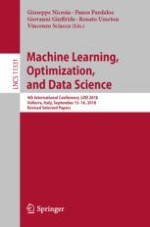2019 | OriginalPaper | Buchkapitel
Evolutionary Construction of Convolutional Neural Networks
verfasst von : Marijn van Knippenberg, Vlado Menkovski, Sergio Consoli
Erschienen in: Machine Learning, Optimization, and Data Science
Aktivieren Sie unsere intelligente Suche, um passende Fachinhalte oder Patente zu finden.
Wählen Sie Textabschnitte aus um mit Künstlicher Intelligenz passenden Patente zu finden. powered by
Markieren Sie Textabschnitte, um KI-gestützt weitere passende Inhalte zu finden. powered by
